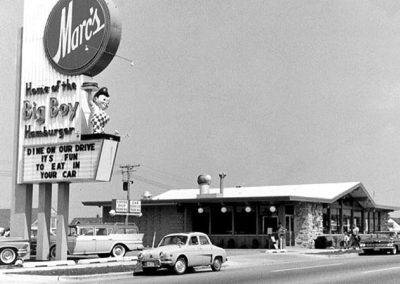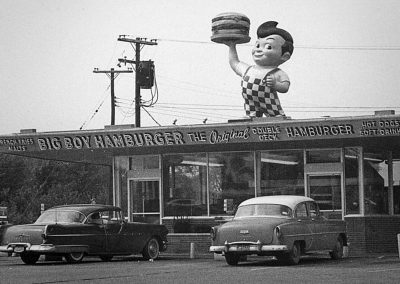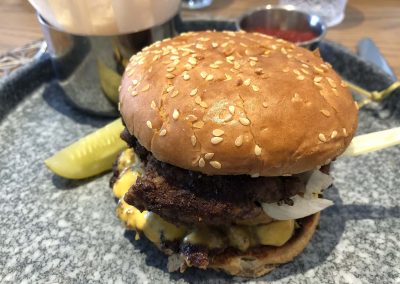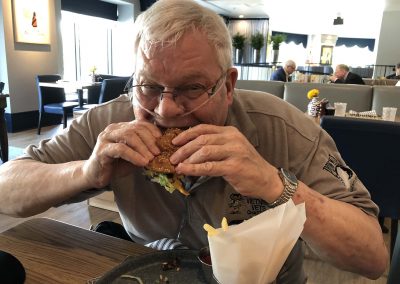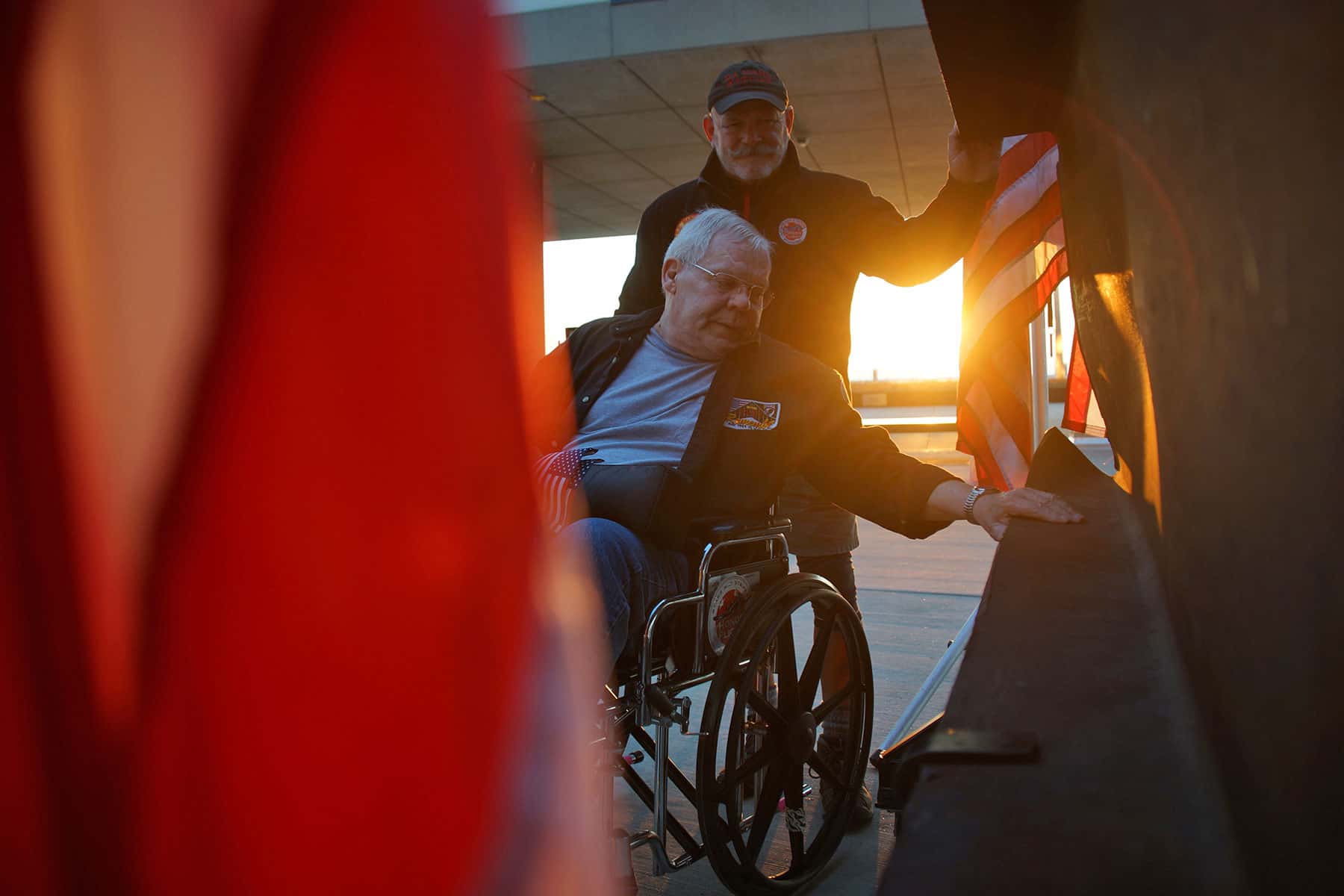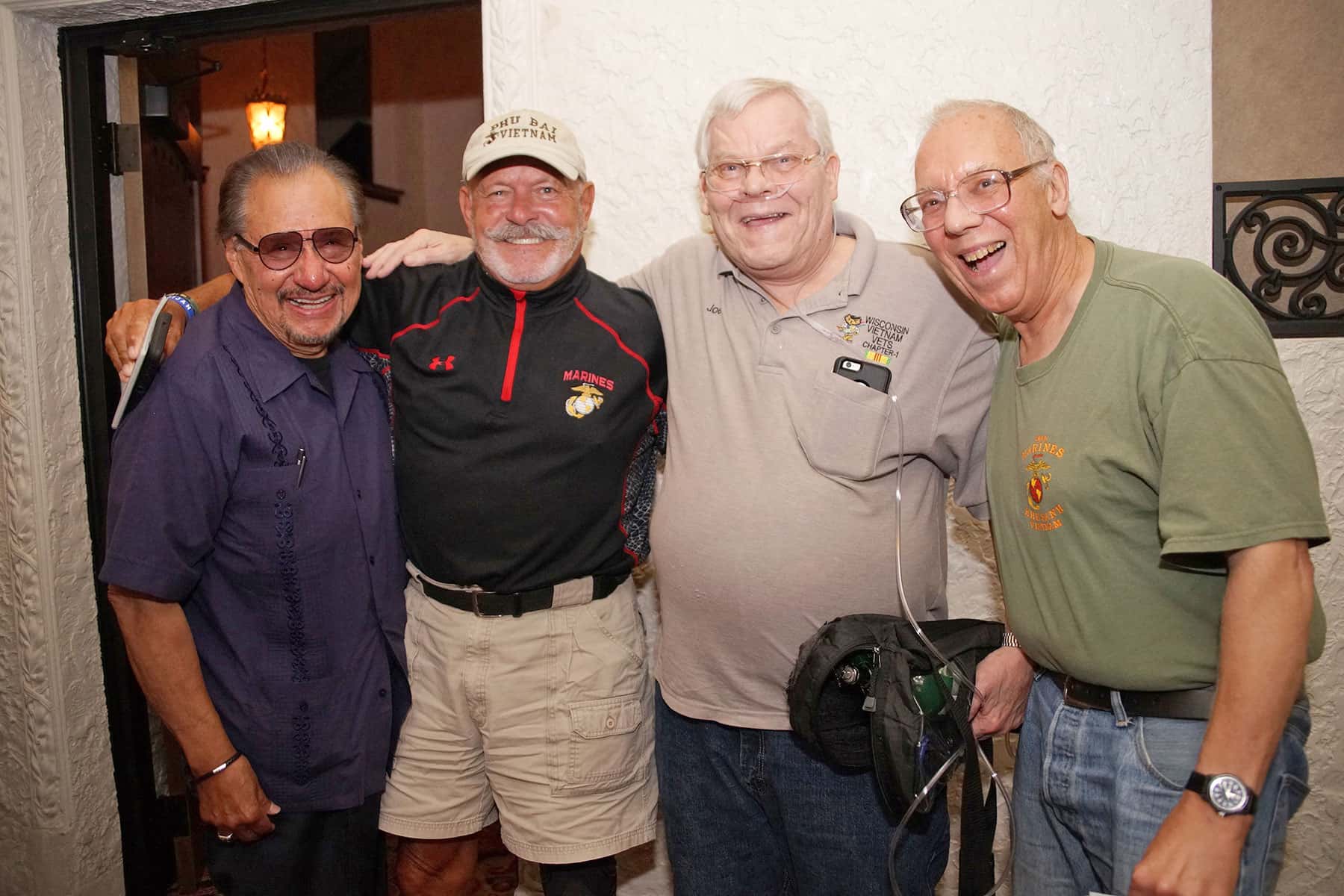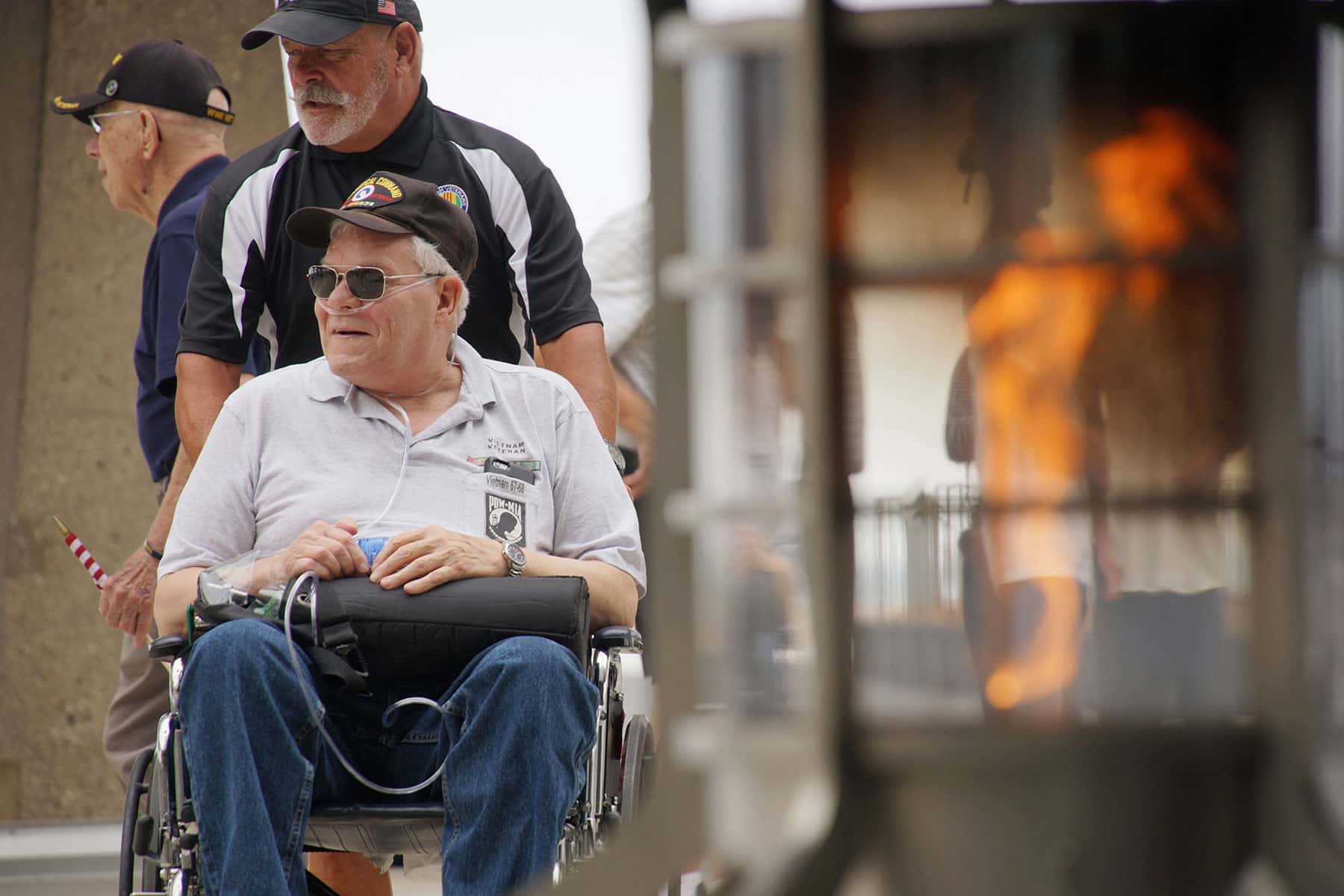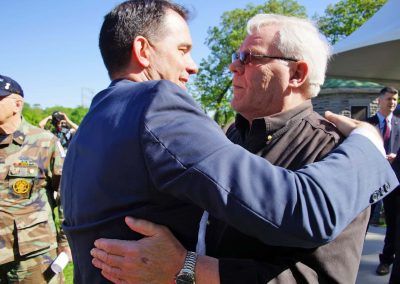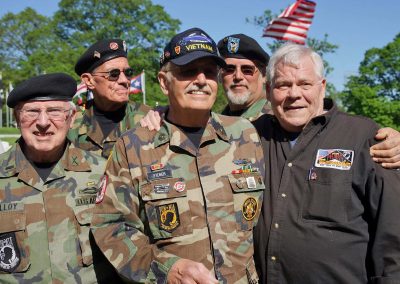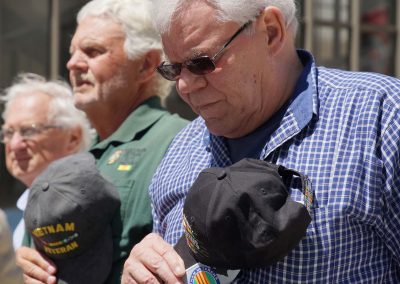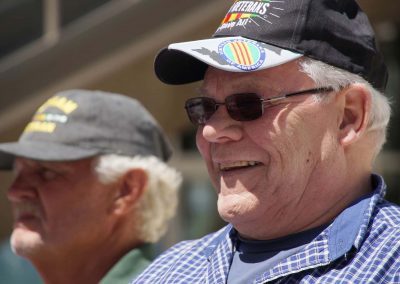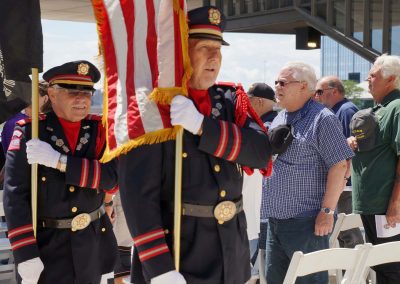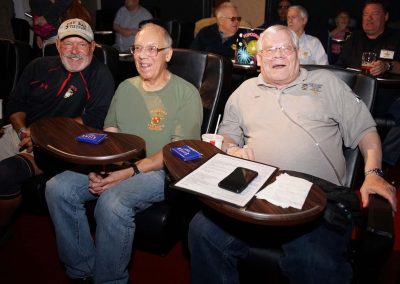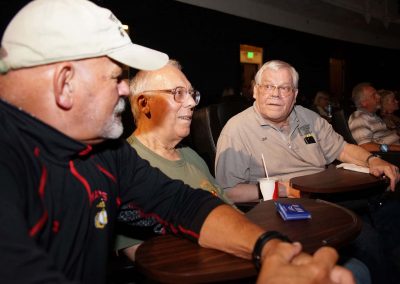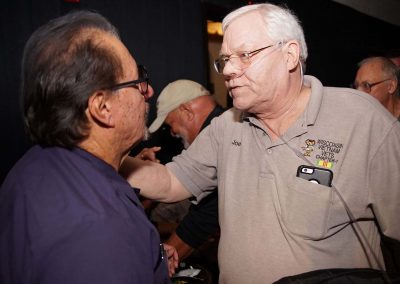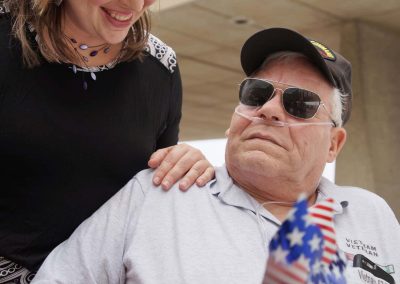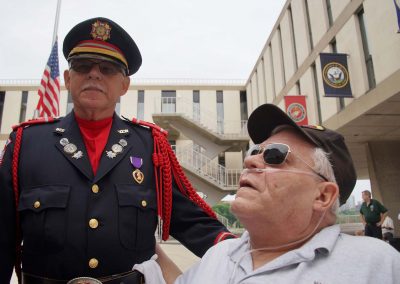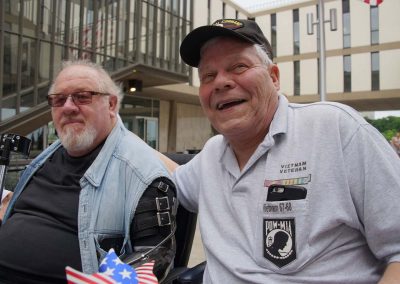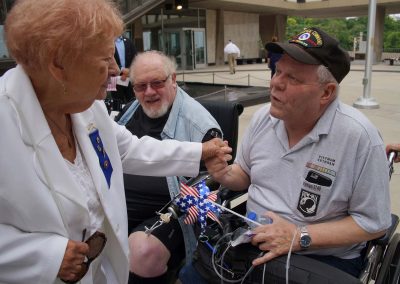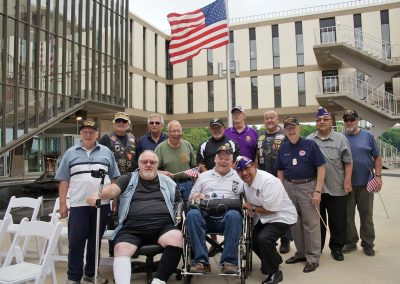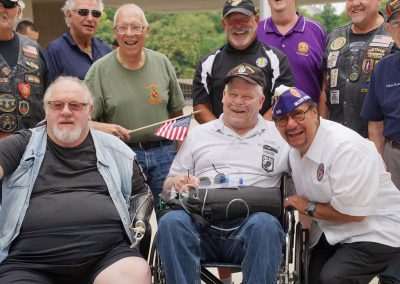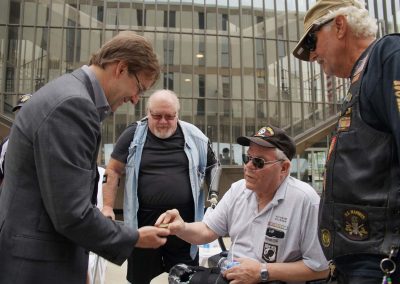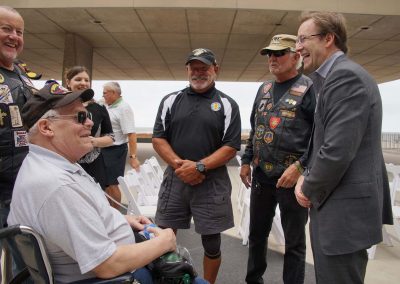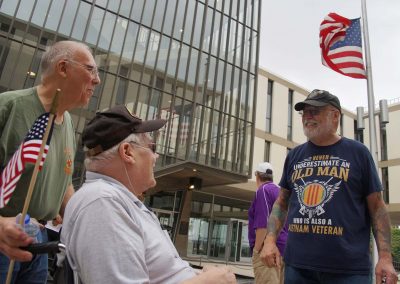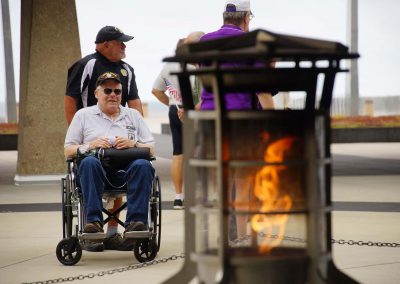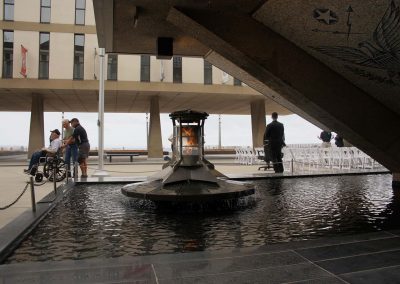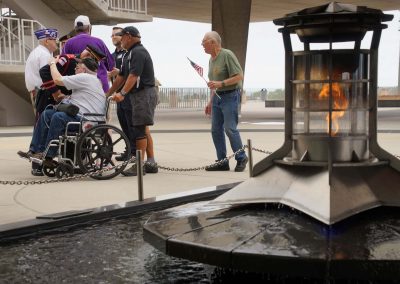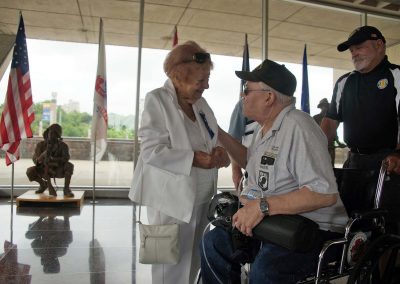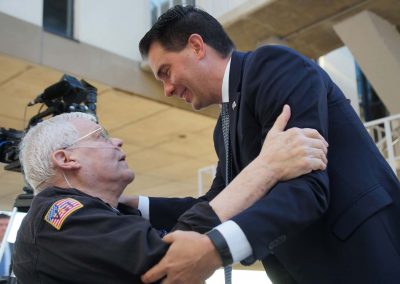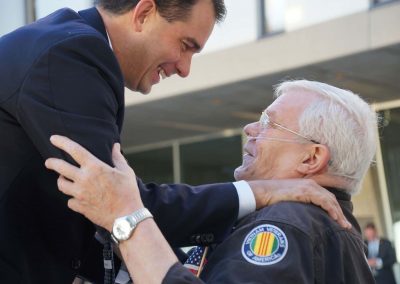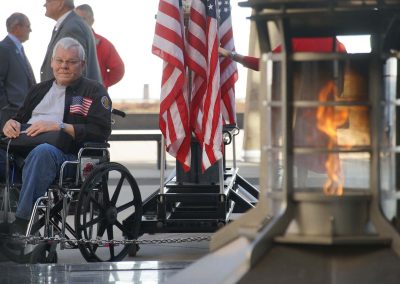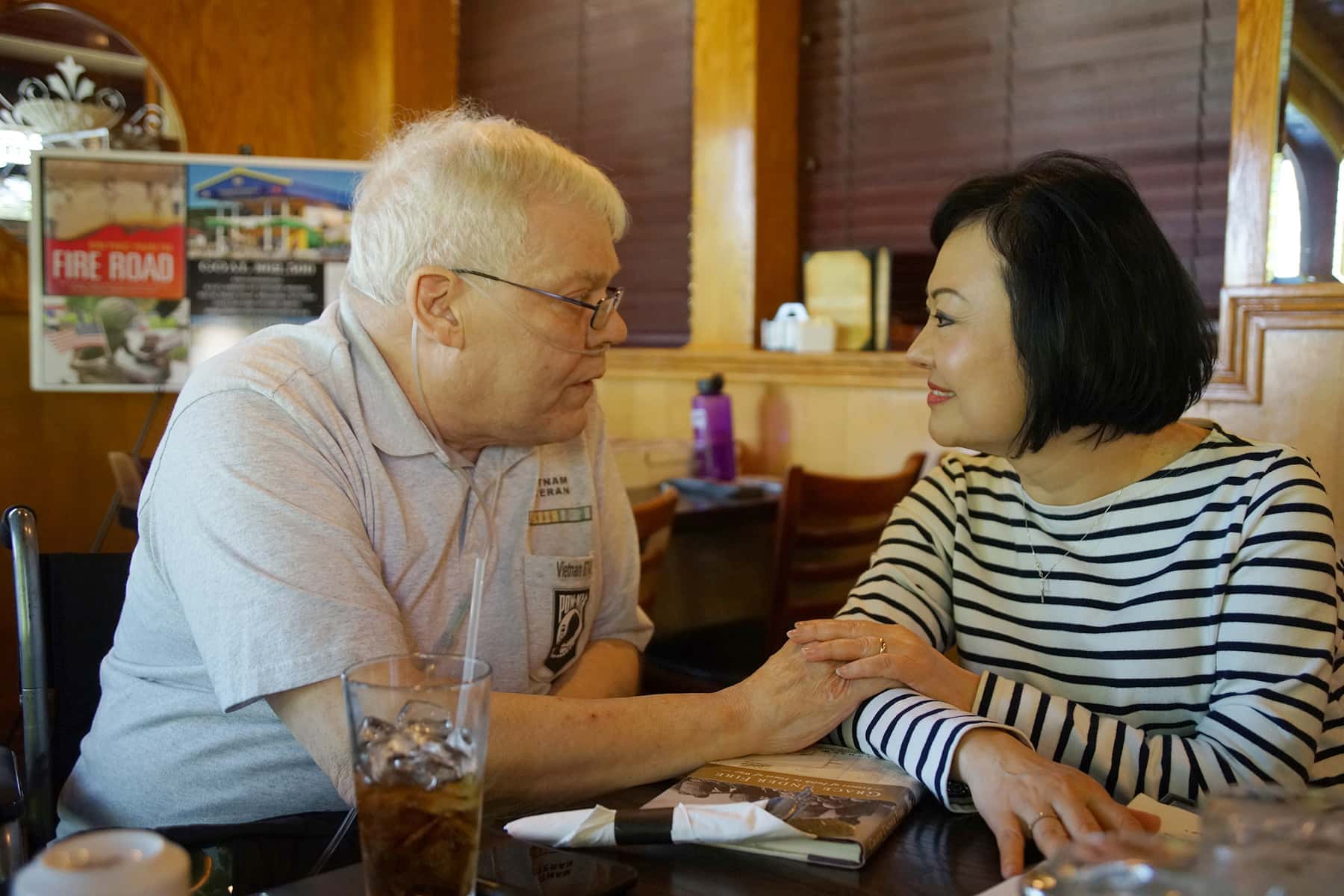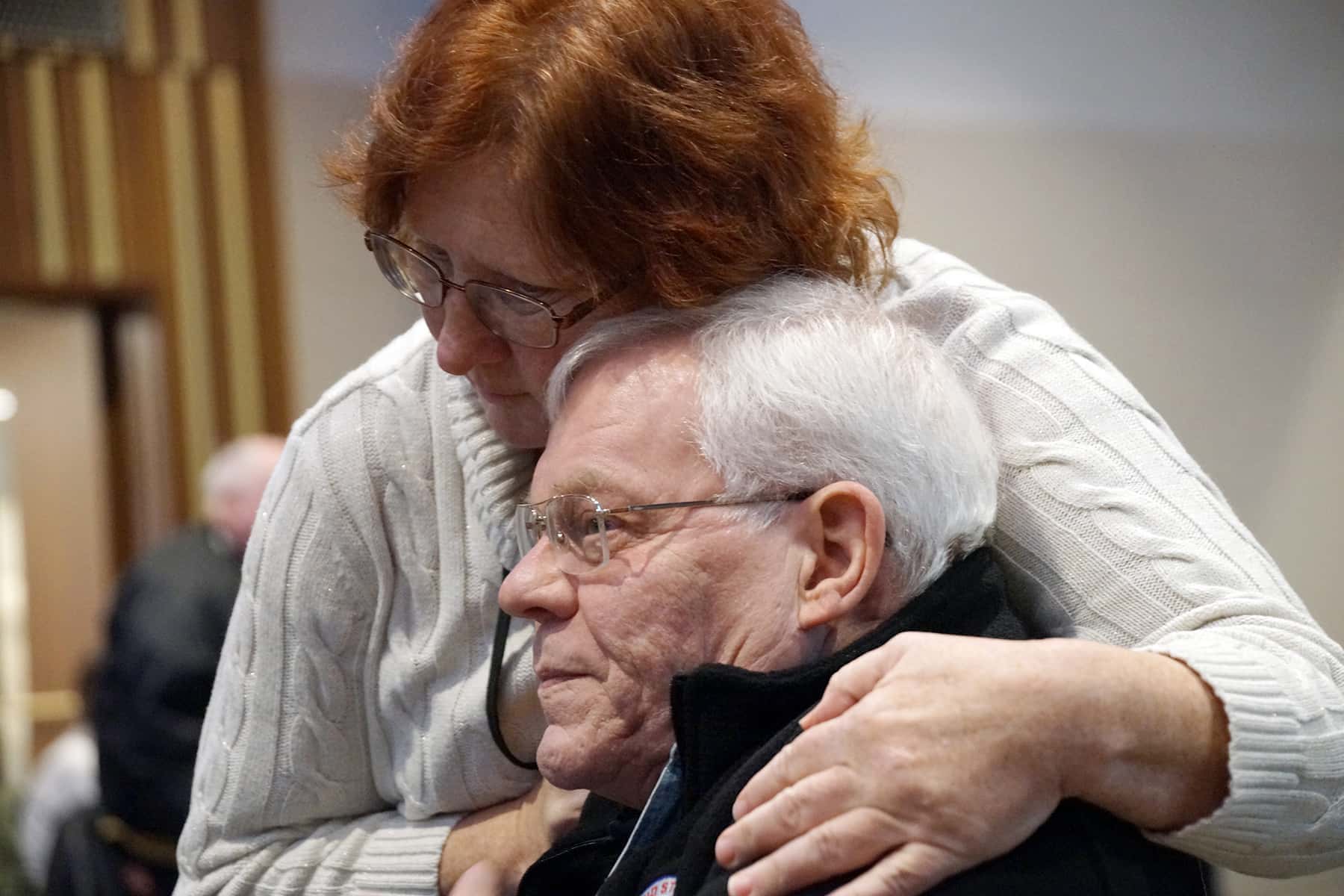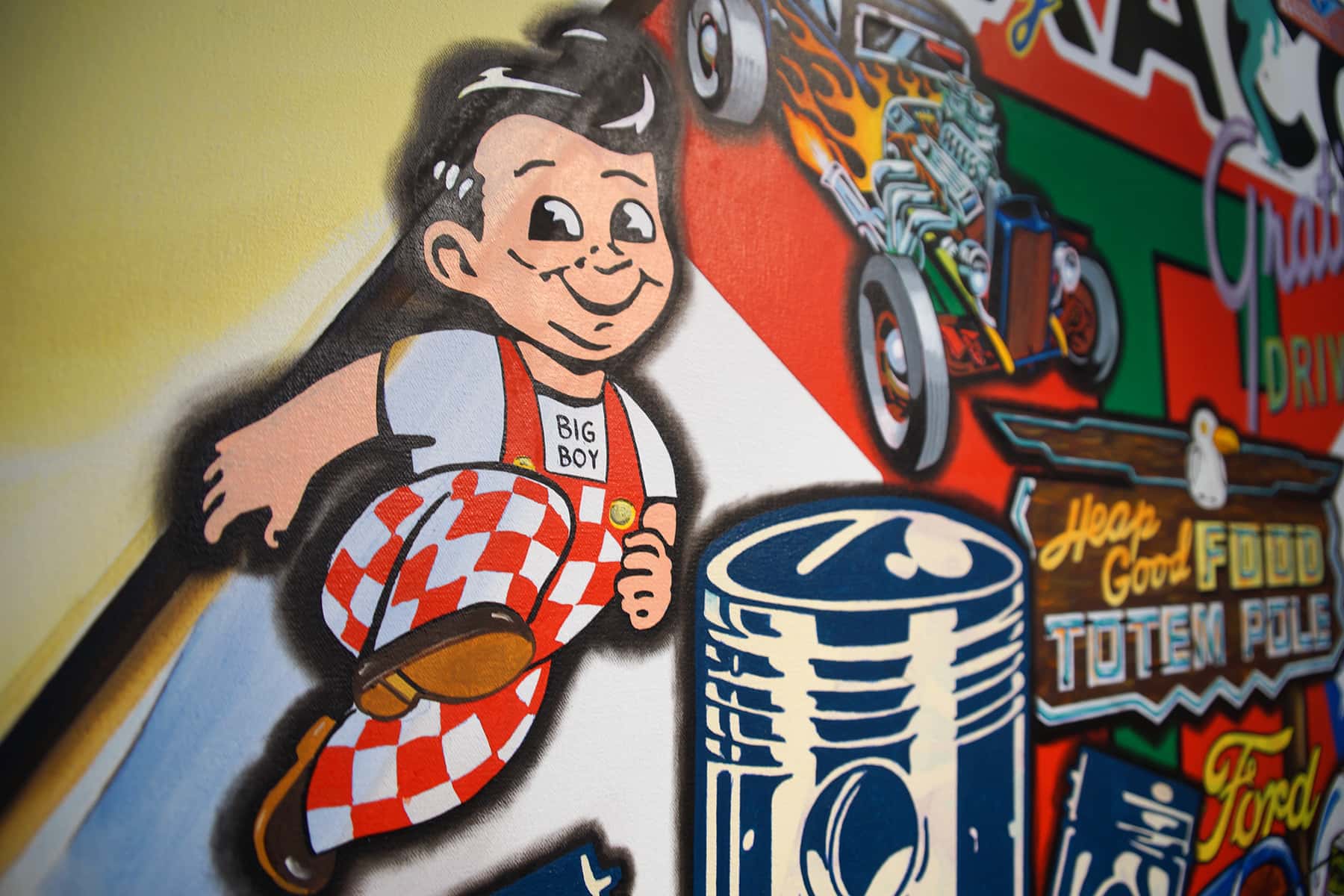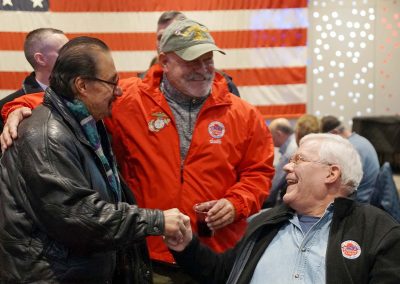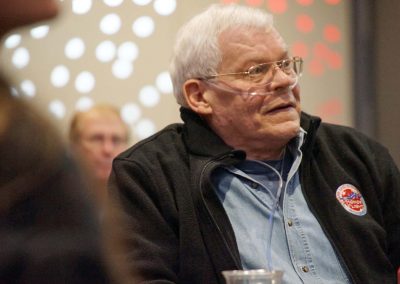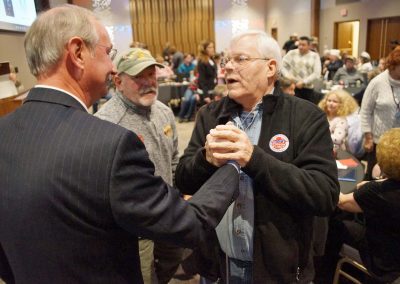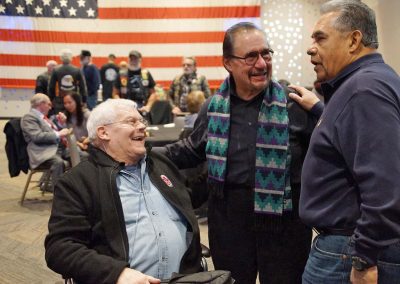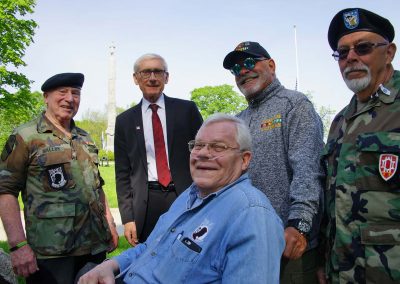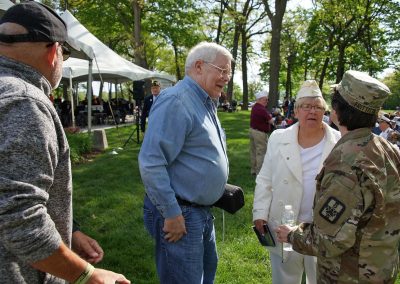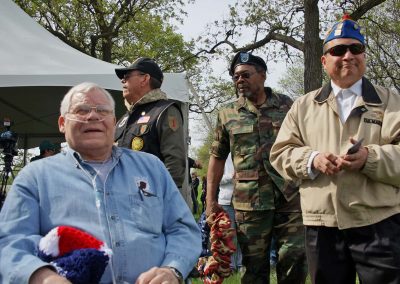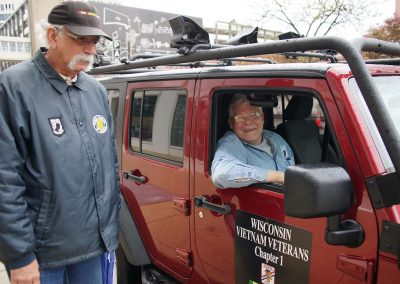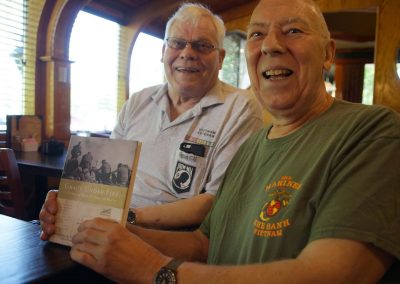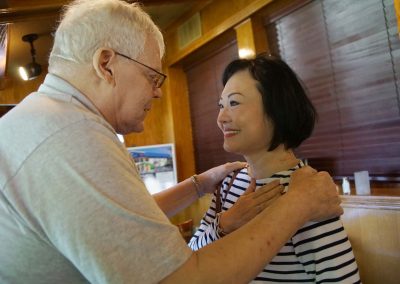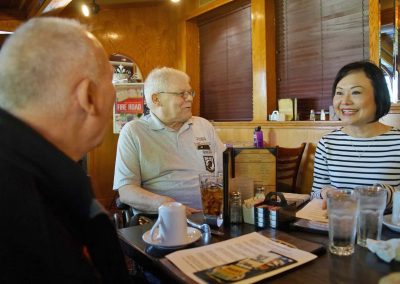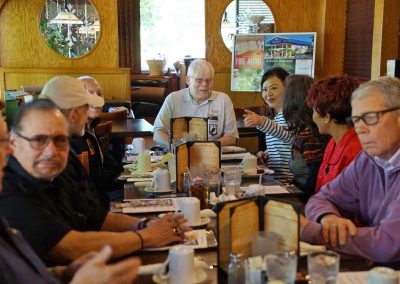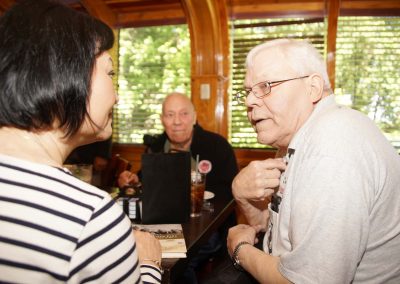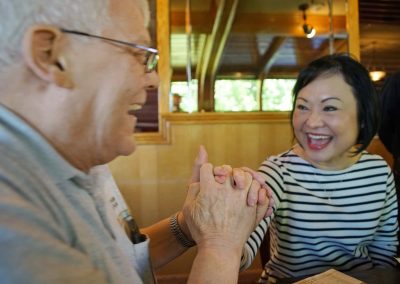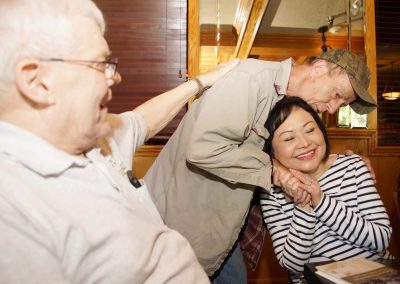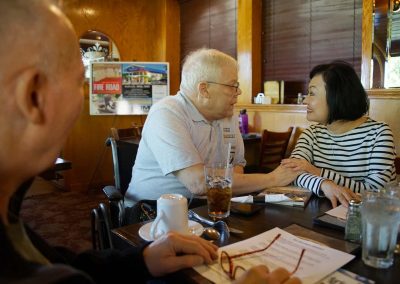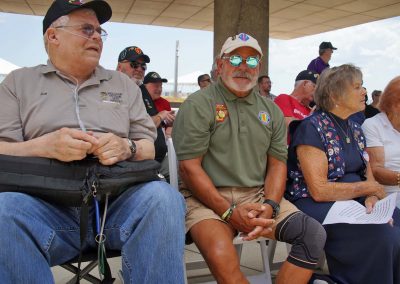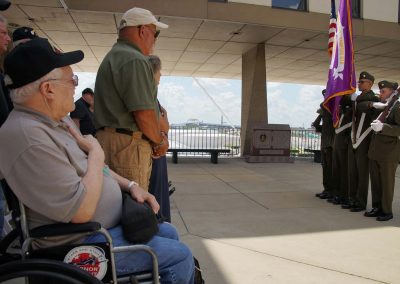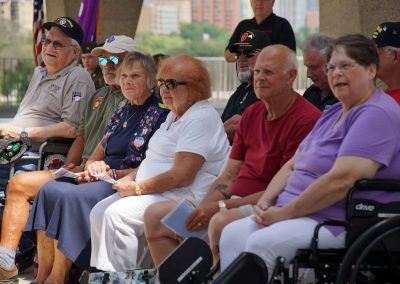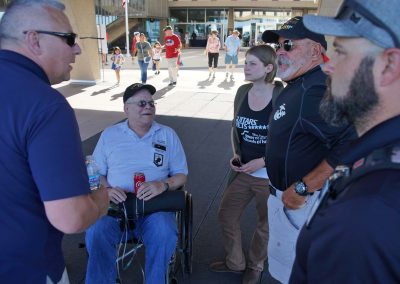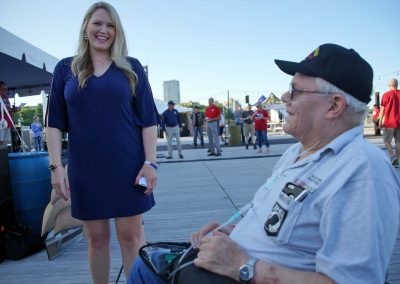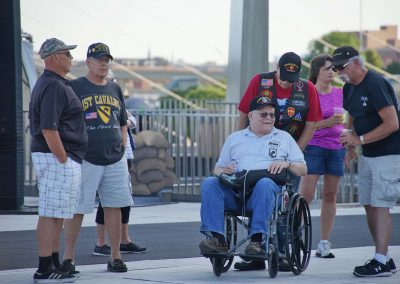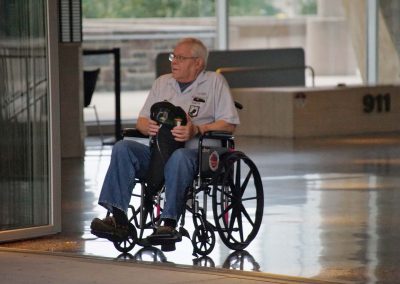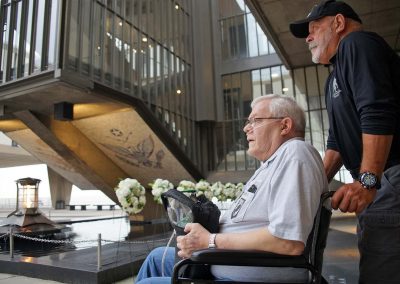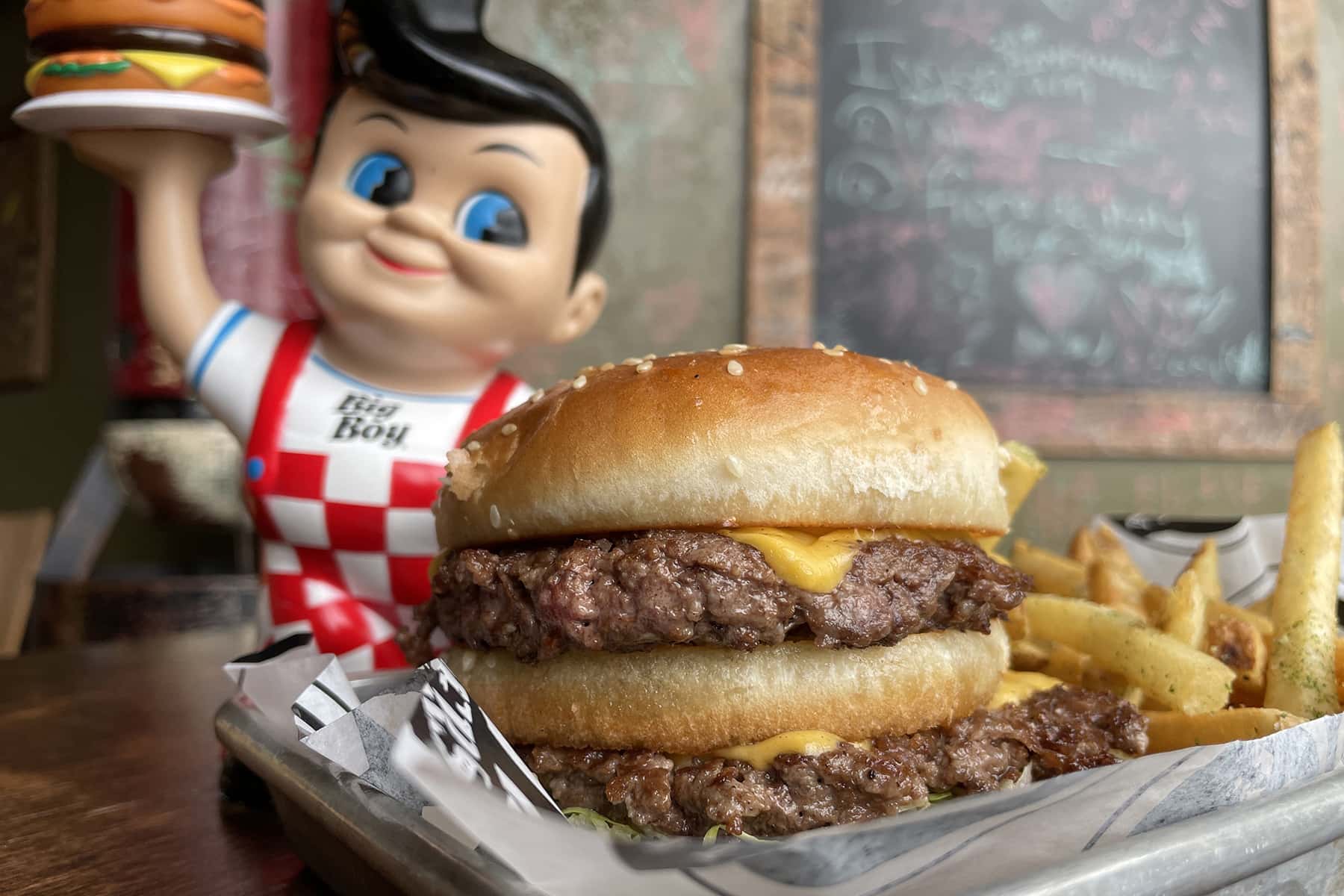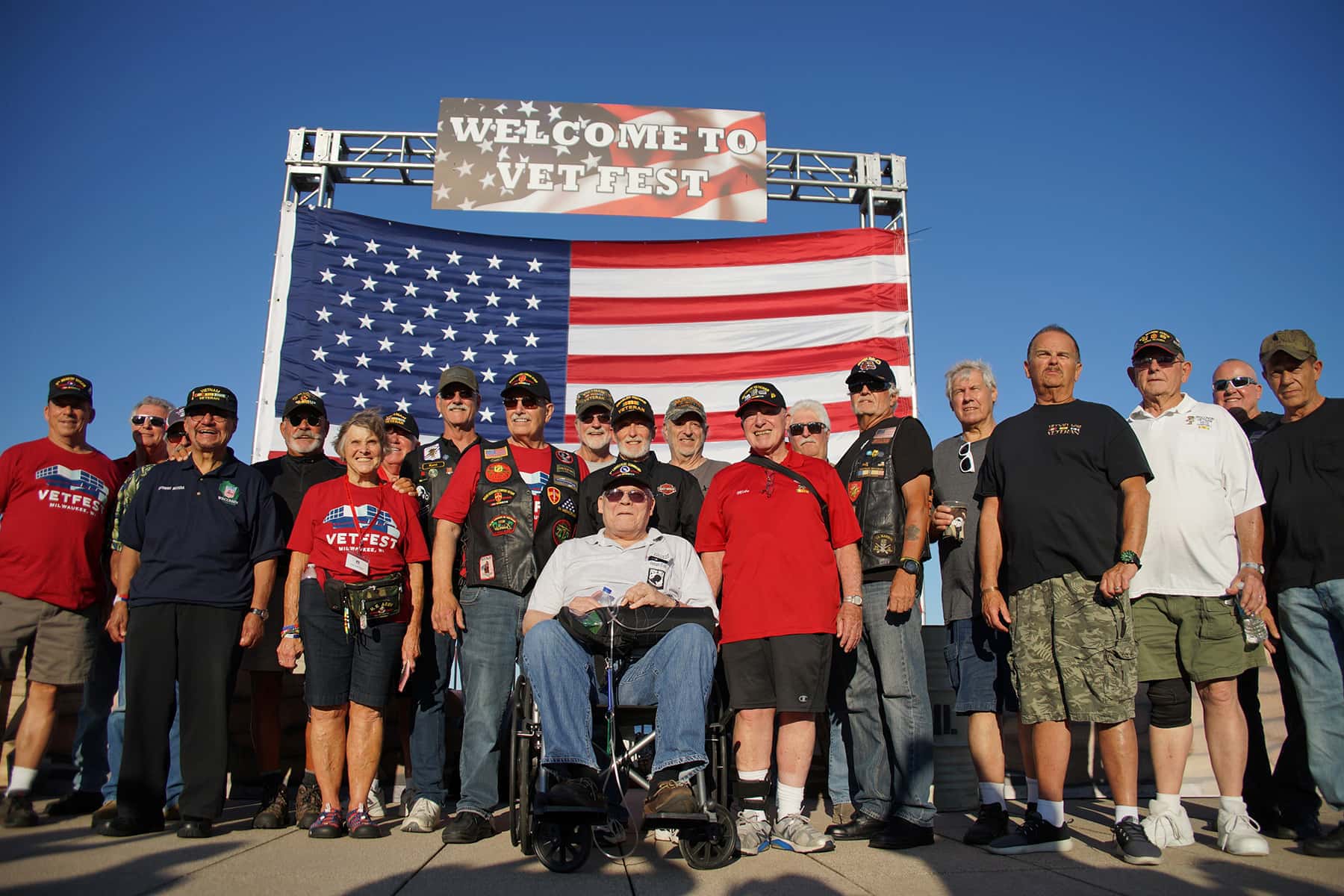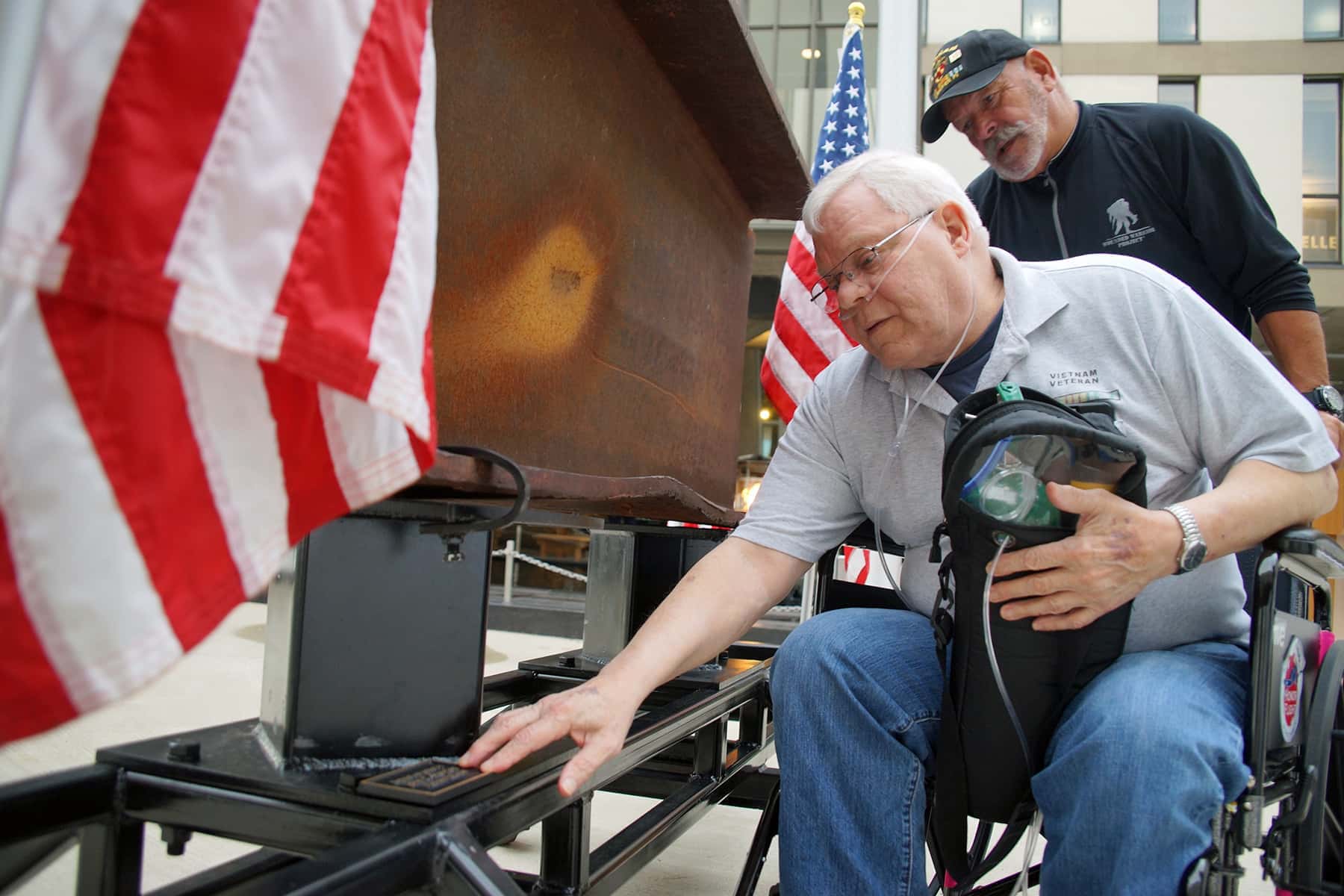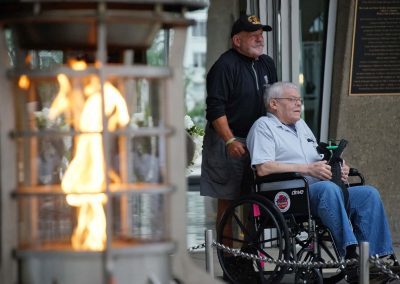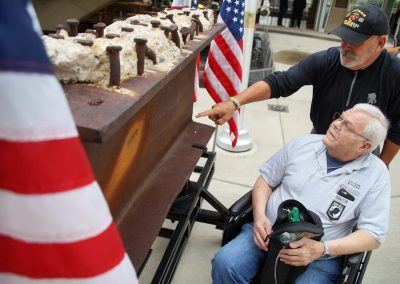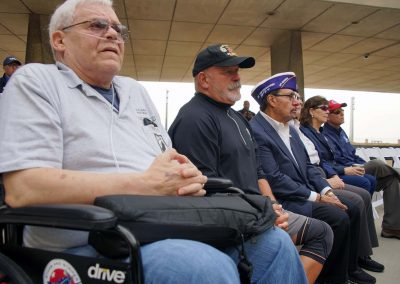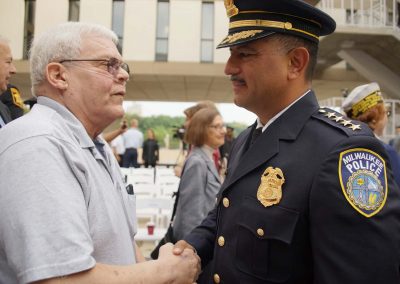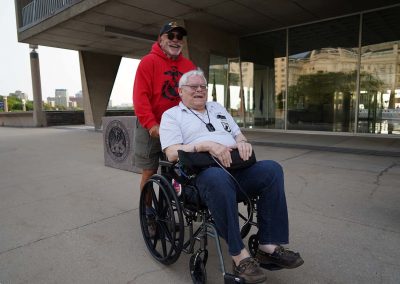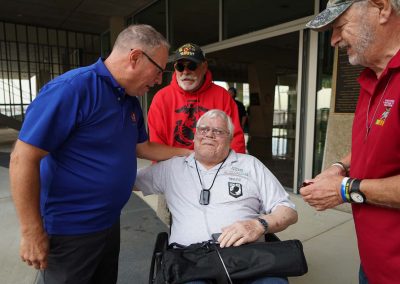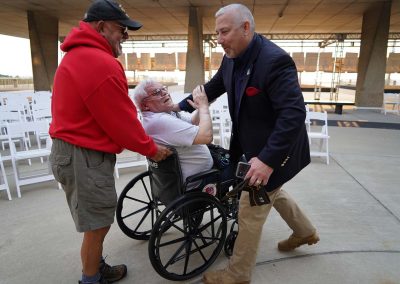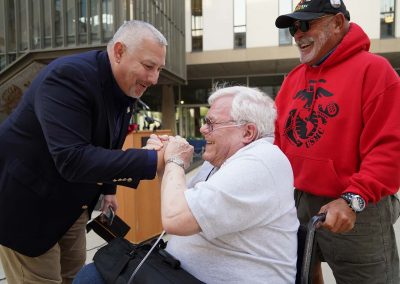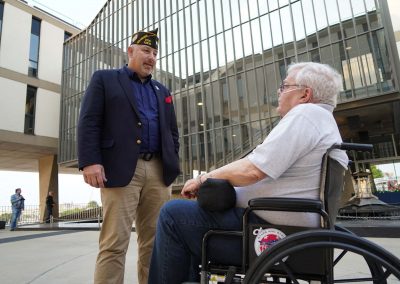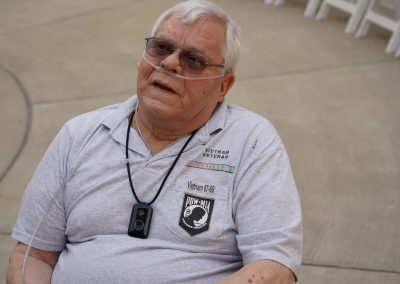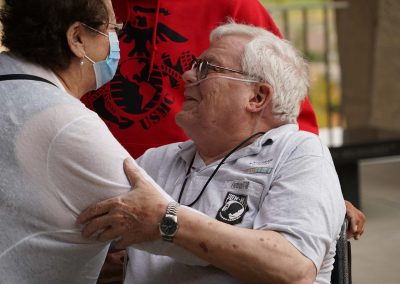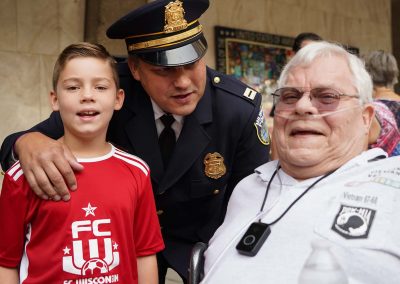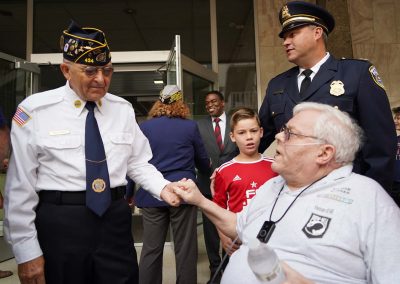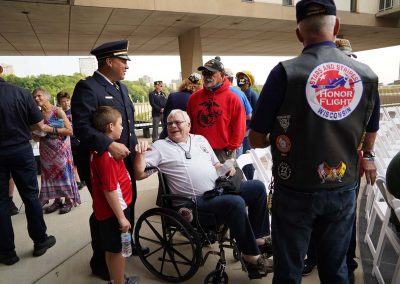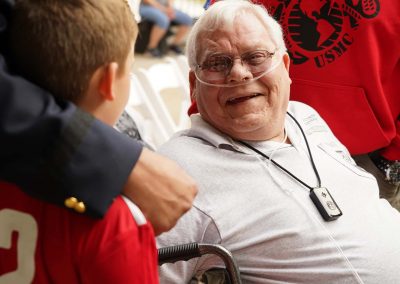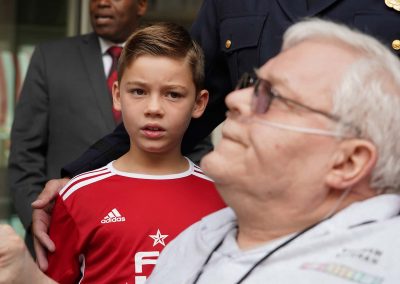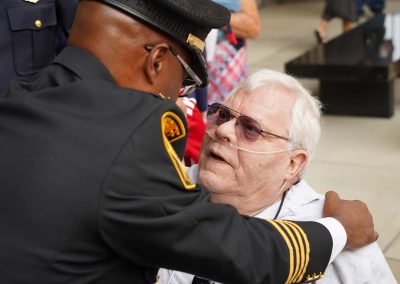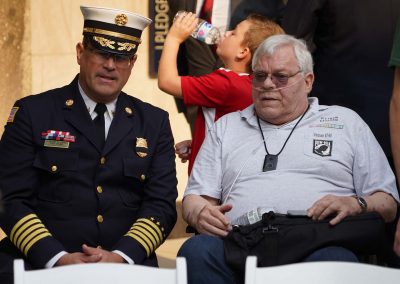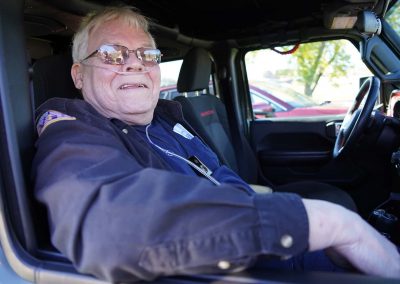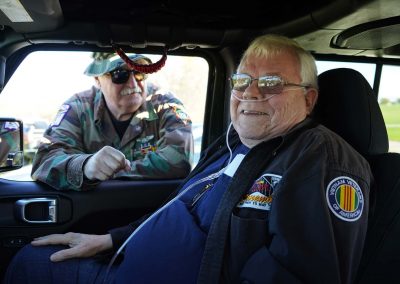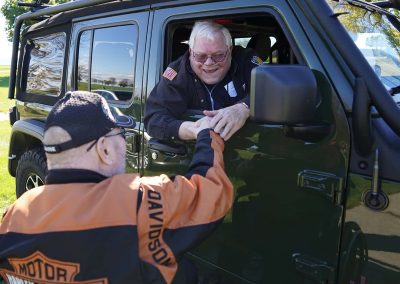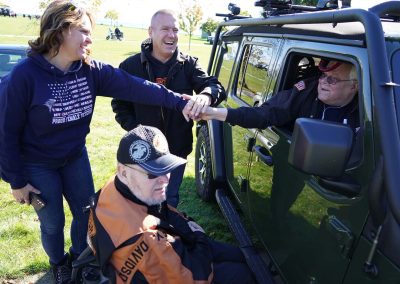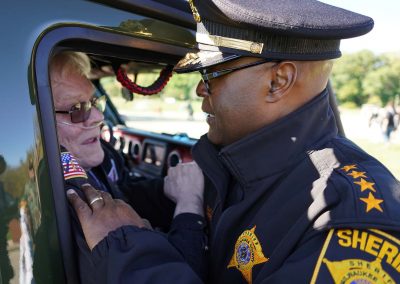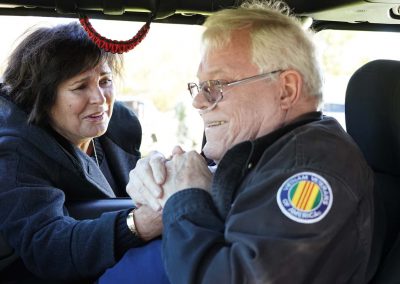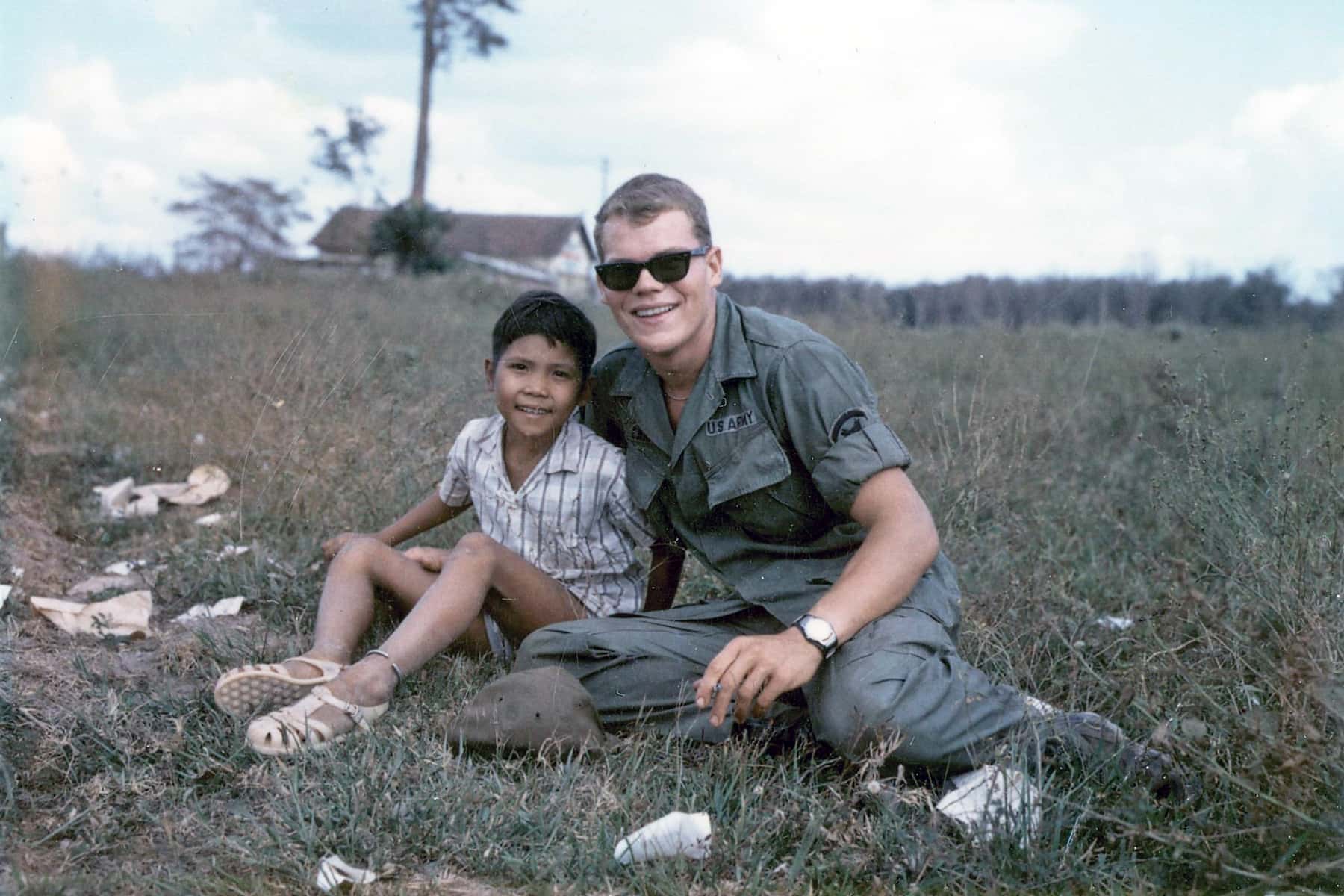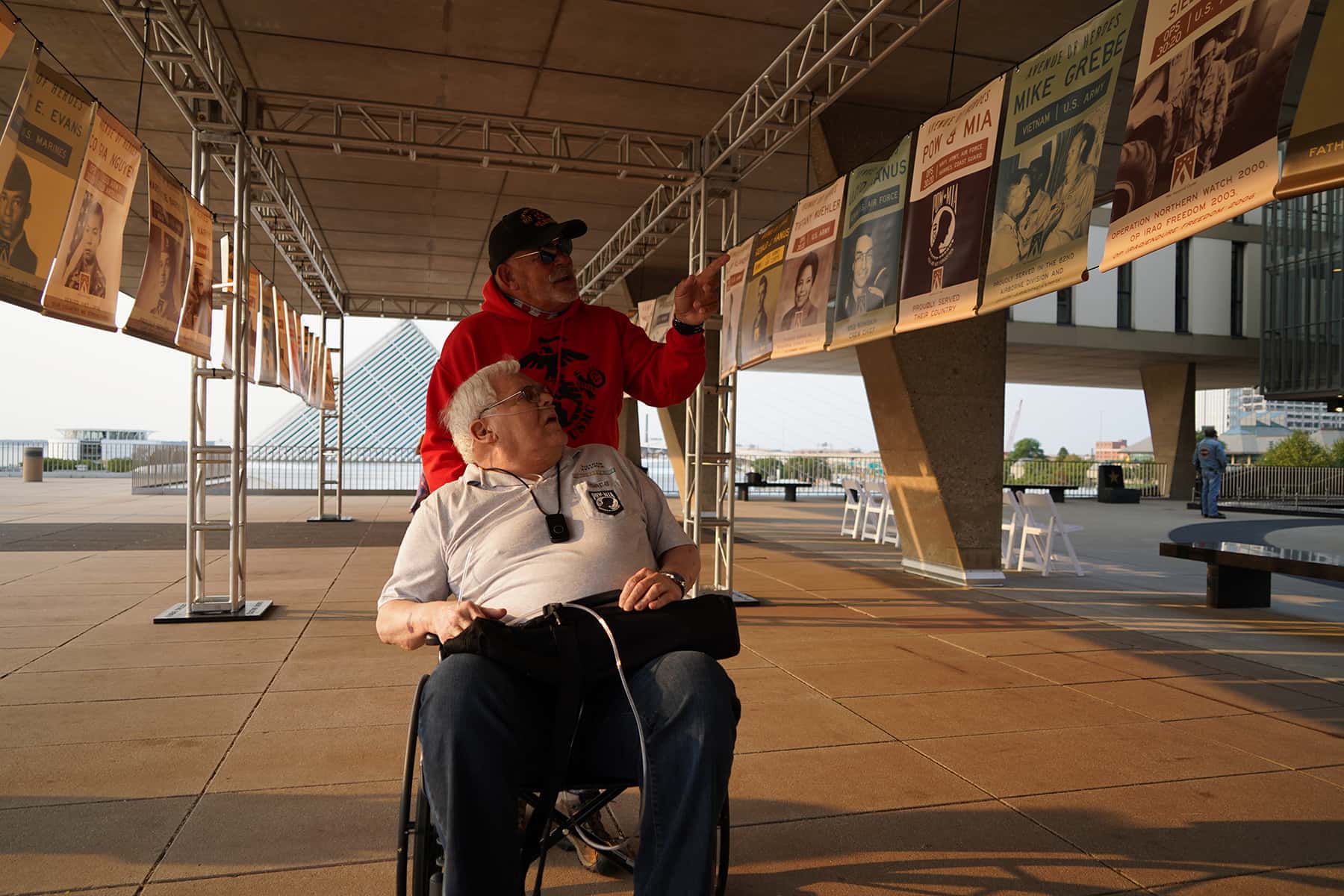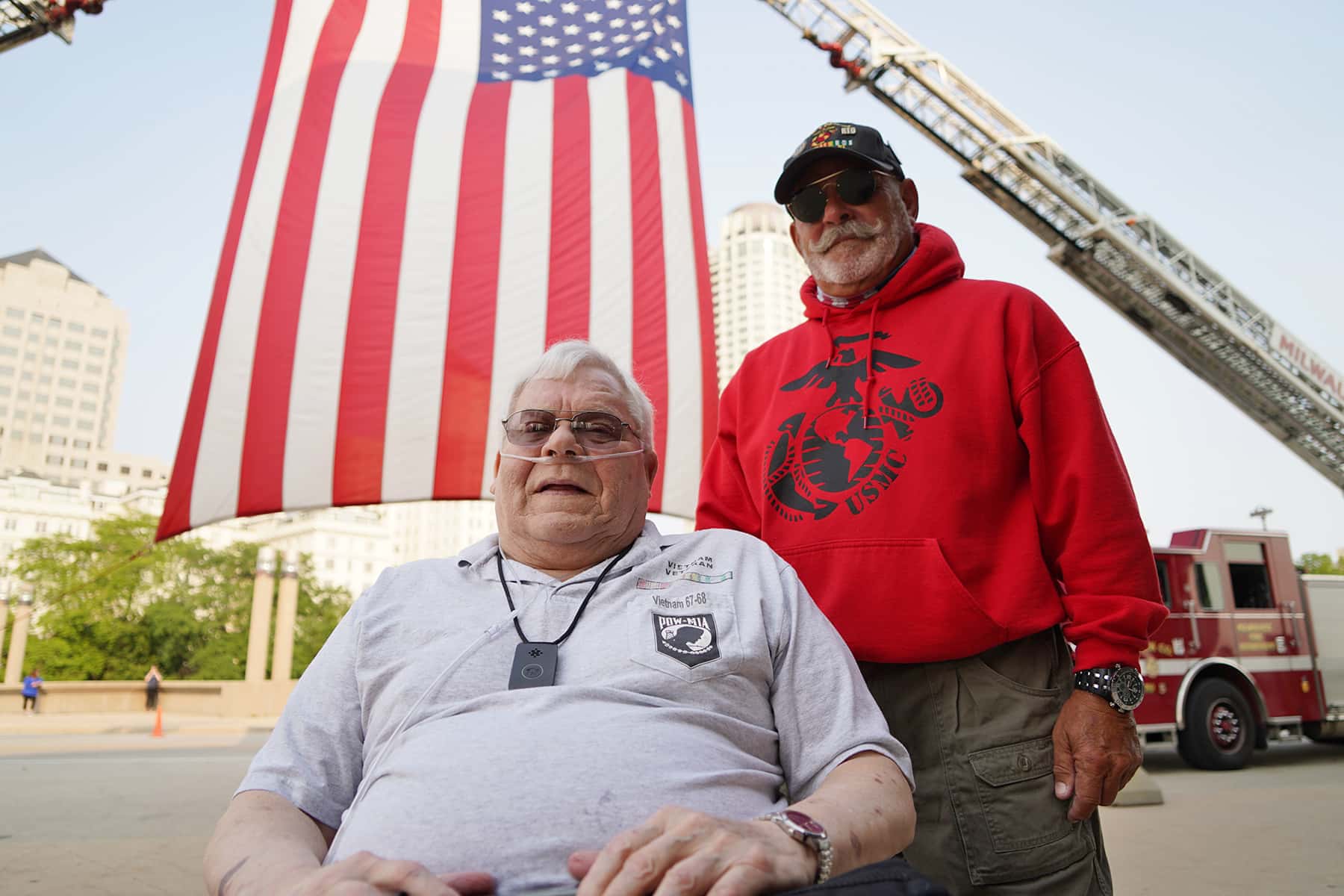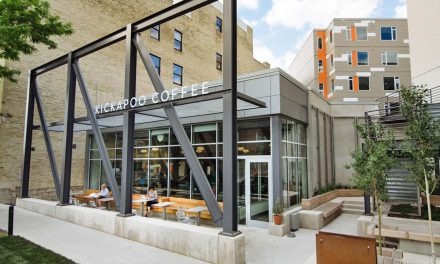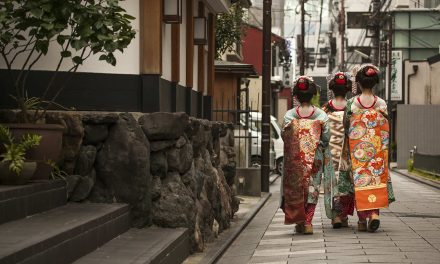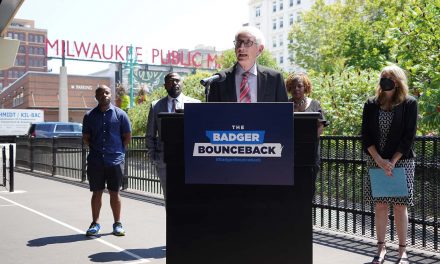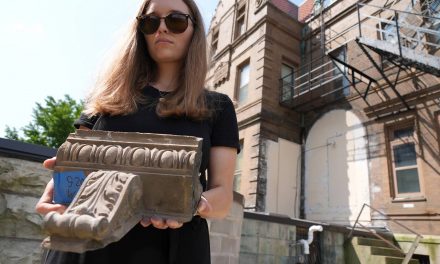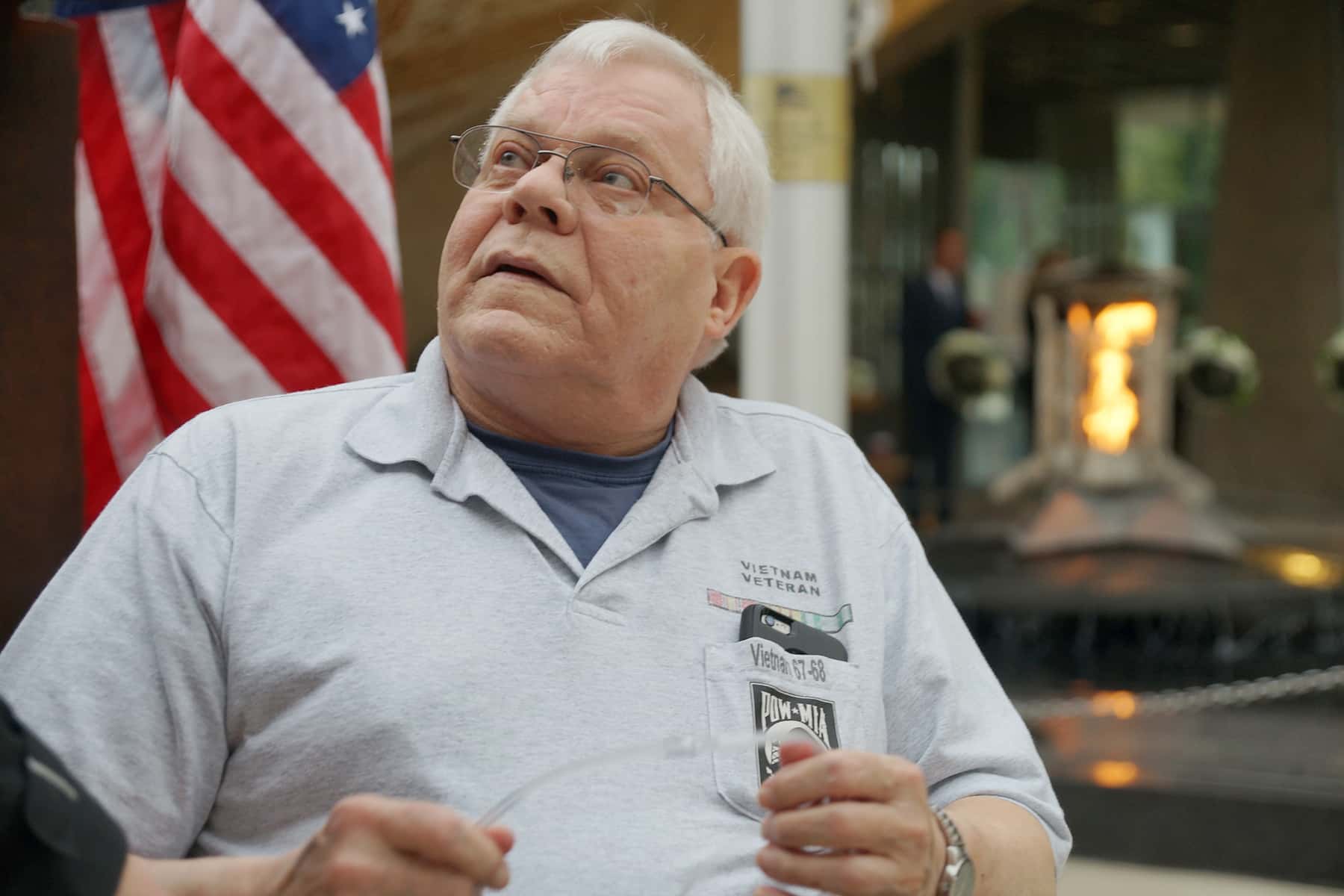
I have actively shared stories about the Veteran community in Milwaukee for years, and used photojournalism to document their commemorative events. At times I was fortunate to highlight some of those former soldiers who once served in the protection of our nation. I lost my own father, a Vietnam veteran, in 2010. He was my Rosetta Stone for understanding others of his generation, and all the complicated issues that influenced their environment.
It has been an honor to get know this group of local Veterans over the years, and be accepted into their circle. I have watched many finally receive the love and respect that they were denied in the 1960s and 1970s for their service in Vietnam. It was a gratitude I saw denied my own father. And yet, each year I watch this group of Veterans get a little older, and experience the ultimate losses that come with age.
It has been a privilege, that I understood and appreciated in realtime, to walk among these men. It is easy and fitting to call them heroes, because of their military service. It is a description that fits them, even though many shy away from that term. At the time, they were just boys who went off to war and did their job. They did what their country asked, without thought to what it would cost them. When they came home to Milwaukee, each had lost something and had to find a way to put their life back together.
Now, they are old men, but no less heroes. And not because of what they did in service of the nation. These men continued with their lives the best they could, carrying the guilt of the friends who they could not prevent falling on the battlefield. They showed courage in combat, but an even more special courage every day since. They lived with the burdens of what they were asked by our country to do.
As I walked among these simple men, who were of a generation of giants in my childhood, I saw their strong spirit of youth, and fragility from age. As much as I tried to put the thought out of my mind, I knew that one day someone from that close group would pass away. I also knew that I would have to write an obituary about a friend. It would be very hard to do.
That day came with the death of Joe F. Campbell, on March 3.
Joe sent me a text on February 17 so that I was alerted to his deteriorating condition:
Hi Brother Lee, I was released from the VA ICU on Monday and my pneumonia, heart disease, and etc. has gotten the best of my body. So the VA Medical Team have set up a ‘Keep Comfort’ approach to the ‘Tomorrows of My Life.’ I have agreed, and I accept this. Lee, I am praying for you. God Bless.” – Joe Campbell
He had been in failing health for a long time, and had not been expected to survive past 2021. Yet he still made the exhausting effort to attend a couple events honoring Vietnam Veterans. My happiness to see him was bittersweet at the same time, because I knew the images I took of him would be some of the last that I could ever take.
Obituaries share the life story of people, detailing the milestones of their career. I would prefer to honor the memory of Joe from my own personal experiences with him.
Very much like my father and many in his generation, Joe was fiercely opinionated. But he was equally loyal and with one of the biggest hearts I have known. We were constantly surrounded by political issues, but we never had any political discussions. We knew that we each had drastically different views on many subjects, yet we always stayed on a common ground founded in respect.
That taught me much over the past few years, where disagreements have pushed people apart. Joe was only ever welcoming and kind to me. He only ever called me brother. And he made it a point to remind me that I was part of the Veteran community and always welcome.
In learning to understand my own father, it helped me to understand Joe. And as I got to know Joe better, that challenged me to evaluate what I knew, and added insight into my father’s post-military experiences.
Even though I was young enough to be his son, Joe used the honorific “brother” as he would an equal, particularly someone who served with him in Vietnam. I never felt I deserved such a distinction, and I tried my best to live up to his esteem. Because Brother Joe had so much respect for me, I could not offer anything less in return.
In June 2019 I wrote about his Vietnam story with Kim Phúc, the little girl in Nick Ut’s famous photo who survived a napalm attack on her village. Brother Joe told me the story about his combat experience regarding the Marc’s Big Boy hamburger, and how that got him through many hard times during the war.
We always hear about the horrors of the war in Vietnam, and about veterans coming home and being mistreated, which unfortunately is true. But at the time, we always felt so isolated because news took so long to reach us. If we wrote a letter home, it would take 3 weeks at least to get an answer, and by then it was hard to remember what the question had been.
So during my last assignment, one of my best friends with me in Phước Vĩnh was from Wheaton, Illinois, and I was from nearby St. Charles. One time when we talking, he asked if I ever went to that Big Boy restaurant in Wheaton, and I said I ate there all the time because it was one of my favorites. I just loved that place, because we could go at night and all these different hot rod cars that would be there.
So I’m out on a mission in Vietnam, and I’m trying to call in our position on the radio while dealing with driving the jeep. I’m talking to my friend on the radio and he asks while I’m out if I could stop by to pick up a Big Boy, an order of onion rings, with a chocolate malt and Coke chaser. And I just could not believe it, I started laughing my head off.
We played that game back and forth a number of times, when we least expected it. When my tour was over in February of 1968 and I came back to the States, my high school sweetheart – who I was engaged to, skipped her college classes that day to be with me. The first place I stopped at on the way home was a Big Boy. I ate in Wheaton, Illinois and ordered a Big Boy, an order of onion rings, with a chocolate malt and Coke chaser.
I just smiled and prayed that my good friend Bill, who was still over there, would come home safe – which he did. We did our job and we did it well, and we can never forget the ultimate sacrifice so many of our brothers made for us. And they relied on us to save them too.
It was things like that that lifted my spirits, and I even have Big Boy posters in my house. It was something that replaced the terrible things we lived, and saw, and helped change the focus.
A couple months later, the Milwaukee County War Memorial Center hosted its annual VetFest in August 2019. After attending the event, Brother Joe invited me to join him for lunch together at Kil@wat in the Intercontinental Hotel, where the classic Big Boy burger was on the menu.
2020 came along soon after, and with it brought the COVID-19 pandemic. Public events were cancelled and what gatherings for Veterans were held had transformed into virtual Zoom meetings. Because of his fragile health, and pandemic restrictions, it would be more than a year before I could see Joe again in person. It would be on the twentieth anniversary of 9/11.
Milwaukee is one of the few cities to have a physical relic from the World Trade Center, with a massive steel beam that was once a part of the fallen landmark. In 2011, Joe and retired Milwaukee Fire Battalion Chief Mark Fox drove it from New York to Milwaukee for the city’s 10th anniversary memorial.
The steel beam was installed at the War Memorial Center to honor not only the 343 firefighters and paramedics killed in the attack, but also the police, Port Authority officers, and civilians who lost their lives that day.
“What happened 18 years ago was terrible, and this is a piece of history that I wish did not exist. But we have it here because I think it is important for people to never forget what the price of freedom is. It’s not free.” – Joe Campbell, September 2019
I was taking photos outside of the War Memorial Center on September 11, 2021 as Joe was leaving. He was in a great deal of physical pain, but he had been determined to attend the 20th anniversary commemorative event. In his particularly gracious way he insisted that I treat myself to a nice lunch. Since he could not join me, he wanted to make sure I had a good experience as thanks for my hard work that day. I reluctantly accepted, because I had decided to use it as a way to honor him and show my own appreciation.
The classic Big Boy burger at the Intercontinental Hotel’s Kil@wat was no more. So my Plan B involved AJ Bombers, who still happened to make a tribute Big Boy. For lunch on September 12, I went there and asked them to make a special burger for me. They let me use the iconic Big Boy figure to take photos with the meal for my friend Joe.
I had that Big Boy burger for lunch in honor of Joe, as a reminder that in the darkest times it is the small moments we treasure that help us survive.
Joe was overwhelmed with emotions when he got my photos. I saw him a month later, at an event commemorating the 30th anniversary of the Vietnam Memorial at Veterans Park along the lakefront. He sat in a car, parked near the event to watch, because of the cold weather and his health. He thanked me for sharing the Big Boy lunch with him.
I felt those images captured our love and respect for each other in ways that no words could.
Joe Campbell should be remembered for a lifetime of work and service. But what brings me the most joy is the childlike glee he had when talking about that Big Boy burger. The memory of that meal to a teenage Joe helped him survive the war with his spirit intact.
As with my own father, I am sure Joe had a dark time after Vietnam and faced many struggles. I understood how those things, and the nature of the world around him, had a hand in crafting his views. Even I grew up with bitterness about how Vietnam Veterans were treated after the war, and later why our country sent them to fight in the first place. It was a complicated time, and there is no limit to the complicated feelings still entangled with the subject.
Joe has been one of the beating hearts of Milwaukee’s Veterans community. I first began photographing him at events because so many politicians gave him hugs. And he always beamed with delight, when others felt soured by time. He told me once about the charity work he was able to do in Vietnam during the holidays, for the children of a village north of Saigon. The memory of that joy was one that he held dearly for decades after.
“I have an old Christmas tree in my house and keep it up. Whenever I get some Vietnam blues – and think poor me, I didn’t get treated right when I got home or whatever – all that goes out the door when I look at the tree. I thank God, and feel so blessed to look back at myself at 19 years old.”
I wish I had been able to know Joe sooner, and photograph him when his health had been better. But I am still thankful for getting to know him as he was. And my life has been all the more enriched because of him.
I do not know how to write about Joe’s death. I have said very little about what he did, and mostly about how I felt about him. Like funerals, obituaries are for the living. I would rather share how I remember him, as a better way to keep his memory alive.
I will continue to attend Veterans events, but with the sadness of knowing Brother Joe’s absence. There will never be another chance to photograph him again, or experience his infectious laugh surrounded by friends. I will feel that loss, which will be shared by others as well.
This is my imperfect tribute to Joe F. Campbell, with appreciation for being able to share a part of our journey through life together. I pray he is reunited with the lost brothers of his youth, and I am thankful he has found peace in a world that will never know the horrors of war.
“It is the soldier, not the reporter, who has given us freedom of the press. It is the soldier, not the poet, who has given us freedom of speech. It is the soldier, not the campus organizer, who has given us the freedom to demonstrate. It is the soldier who salutes the flag, who serves beneath the flag, and whose coffin is draped by the flag, who allows the protester to burn the flag.” – Father Denis O’Brien, United States Marine Corps
- Napalm Girl: Vietnam veterans embrace Kim Phúc and her message of love during Milwaukee visit
- Joe F. Campbell: From Trảng Bàng to Big Boy and the little moments in war that offer hope
- 44 years after the Fall of Saigon: Fathers, footsteps, and photos from Vietnam 22 years ago
- Milwaukee heroes honored on National Vietnam War Veterans Day for their service and sacrifices
- Beyond Veterans Day: How the public can honor retired members of the military on the other 364 days
- Veterans Day Parade fights to prevent apathy so Milwaukee’s retired soldiers are not forgotten
- Veterans Day Parade 2018 honors Milwaukee’s Red Arrow Division for its WWI service
- Photo Essay: Milwaukee’s 54th Annual Veterans Day Parade salutes hometown heroes
- Online patriots too lazy to honor troops by actually attending Veterans Day Parade
- After the Armistice black WWI veterans had to keep fighting for democracy at home
- Thank You, Canada, for loving Milwaukee Veterans
- Veterans Week to highlight business contributions by Milwaukee’s retired soldiers
- Five news features from military heroes to racial trauma honored at Press Club Awards
- United by loss: Milwaukee veterans and first responders commemorate the 20th anniversary of 9/11
- Milwaukee leaders hold virtual 9/11 remembrance on 19th anniversary amid staggering pandemic loss
- Never Forget: Milwaukee pays tribute to victims of 9/11 during 18th anniversary memorial ceremony
- Milwaukee honors 9/11 victims on 17th anniversary of the national tragedy
- Photo Essay: 9/11 tribute at Milwaukee War Memorial Center
- Alderwoman Chantia Lewis: Standing together on 9/11
- Op Ed: Wisconsin’s veterans at risk under 9/11 lawsuit bill
- Photo Essay: Milwaukee Remembers 9/11
- Pardeep Kaleka: Testimony on post 9/11 rhetoric
- Inconvenient Images: How pictures teach us to see the world for what it is
- Milwaukee’s hometown Air Wing kicks off Armed Forces Week with aerial refueling flight
- William Pelkofer: Wisconsin Air National Guardsman takes home-grown path for pilot training
- Dawn of the Red Arrow: Documentary details birth of Wisconsin’s 32nd Division in World War I
- Bay View students revive Lance P. Sijan Memorial Scholarship as example of leadership, love, and honor
- Brewers legend Robin Yount recognized for years of citizen involvement in helping the Armed Forces
- Gold star family, George Banda, and Iwo Jima veterans recognized with Sijan award for valor
- Milwaukee Notebook: Red Arrow, the Park that Moved
- Janine Sijan Rozina: A story not of war but the spirit of love
- “Sijan” and Chip Duncan’s “The First Patient” among world premieres at Milwaukee Film Festival
- Fellow POWs honor their fallen brother at Sijan Plaza dedication
- Photo Essay: Preview of Sijan Plaza and memorials of honor
- Photo Essay: An example of courage installed at Mitchell Airport
- Ben Domian: a life influenced by family and Lance Sijan
- Vietnam combat medic George Banda honored at tribute to Latino veterans
- George Banda: The Humble Hero
- Audio: An American story from Mexico to Vietnam
- George Banda: Honoring lost friends in vigil to Vietnam veterans at The Wall
- Lynn Novick: A discussion about her Vietnam War film on Veterans Day
- Maya Lin: Ceremony marks 35th anniversary of Vietnam Memorial’s healing power
- The irony of visiting heroes at Arlington, the former home of a national traitor
- Photo Essay: Seeing the Nation’s Capital with Milwaukee Eyes
- Purple Heart Day honors Milwaukee’s wounded veterans
- Photo Essay: Milwaukee’s 54th Annual Veterans Day Parade salutes hometown heroes
- Online patriots too lazy to honor troops by actually attending Veterans Day Parade
- Thank You, Canada, for loving Milwaukee Veterans
- Aerial demonstration squadrons announced for 2019 Air & Water Show
- Flying with the Golden Knights during the Milwaukee Air & Water Show
- Air & Water Show 2018 performances prepared and waited for weather to clear
- Exclusive: 360° view of skydive at 2,000 feet over Milwaukee with precision landing
- Video: Army’s elite parachute demonstration team descends over lakefront
- Airshow sees Army Parachute Team descend through the atmosphere
- Photo Essay: Golden Knights Practice Jump attempt at 2,000 feet
- Photo Essay: Golden Knights Precision Landing from 12,500 feet
- Photo Essay: Free-falling with the Golden Knights Demonstration Team
- Video: U.S. Army Golden Knights parachute into Milwaukee Airshow
Lee Matz and Joe F. Campbell

